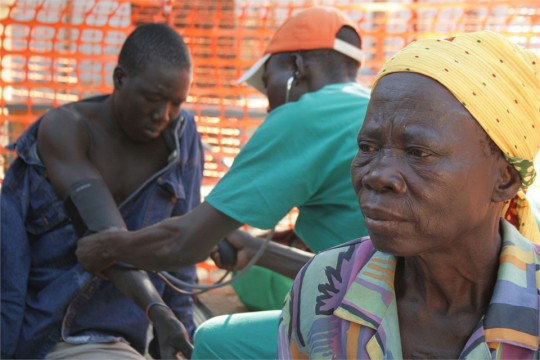Cholera outbreak in Central and West Africa ‘one of the worst ever’ – UN
 In a news release issued today, UNICEF urged governments to coordinate their preparation and response measures not only within their borders but also with neighbouring countries to prevent the spread of the disease.
In a news release issued today, UNICEF urged governments to coordinate their preparation and response measures not only within their borders but also with neighbouring countries to prevent the spread of the disease.
“It is clear in this emergency that authorities can play a key role to save lives. Information exchange between cross-border districts on caseloads and population movements, as well as cross-border inspections for disinfection and chlorination are proven ways to contain the disease and save lives,” the agency said.
This year the region has had more than 85,000 reported cholera cases, resulting in 2,466 deaths, which make it one of the biggest epidemics in the region’s history.
In addition, fatality rates remain unacceptably high, ranging from 2.3 per cent to 4.7 per cent and reaching much higher levels in countries such as Cameroon.
There are currently three major cross-border epidemic outbreaks in the region: the Lake Chad Basin which includes Chad, Cameroon, Nigeria and Niger; the West Congo Basin comprising of the Democratic Republic of the Congo (DRC), the Republic of the Congo and the Central African Republic (CAR); and Lake Tanganyika, which includes the DRC and Burundi.
The most significant increases in the number of cases, however, are concentrated in Chad, Cameroon and the DRC. Smaller cholera epidemics in Benin, Cote d’Ivoire, Ghana, Guinea, Liberia, and Togo are reportedly under control.
UNICEF has been providing treatment kits, conducting awareness campaigns and assisting with surveys to ensure that efforts are effectively targeting those who need assistance.
Last week, the agency sent health and sanitation experts to the CAR after the Government confirmed an outbreak and it said it was expecting to reach 60,000 people in a few days.
Access rates to water and sanitation in West and Central Africa are among the lowest in the world, making it extremely vulnerable to cholera outbreaks since the disease is caused by eating food or drinking water contaminated with a bacterium.
Although response measures can help contain its spread, the most effective way of fighting the disease is to tackle its cause by ensuring access to clean water and raising awareness of the importance of sanitation and hygiene standards.![]()
###
> United Nations (UN).
 The United Nations was established on 24 October 1945 by 51 countries committed to preserving peace through international cooperation and collective security. Today, nearly every nation in the world belongs to the UN: membership totals 192 countries.
The United Nations was established on 24 October 1945 by 51 countries committed to preserving peace through international cooperation and collective security. Today, nearly every nation in the world belongs to the UN: membership totals 192 countries.
When States become Members of the United Nations, they agree to accept the obligations of the UN Charter, an international treaty that sets out basic principles of international relations. According to the Charter, the UN has four purposes:
- to maintain international peace and security;
- to develop friendly relations among nations;
- to cooperate in solving international problems and in promoting respect for human rights;
- and to be a centre for harmonizing the actions of nations.
* The above story is adapted from materials provided by United Nations (UN)
** More information at United Nations (UN)




















